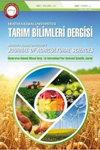转基因棉花在干旱胁迫下的生理生化和分子响应
IF 1.1
4区 农林科学
Tarim Bilimleri Dergisi-journal of Agricultural Sciences
Pub Date : 2017-04-28
DOI:10.15832/TBD.09164
引用次数: 8
摘要
干旱降低了棉花的生长和产量。热休克蛋白在水分胁迫下在植物体内积累,在分子水平上保护植物的生化和生理过程。本研究以含小热休克蛋白基因(GHSP26)的转基因棉花T2分离代植株与野生型植株在不同时期干旱胁迫下的生化、生理和分子反应进行比较。转基因植株的脯氨酸含量比野生型高出30%。转基因植株的脂质过氧化活性降低,表明抗旱效率提高。10 d干旱胁迫下,转基因和野生型植株叶片相对含水量分别为69%和45%。与野生型相比,转基因植株在光合作用、气孔导度、蒸腾和渗透电位方面表现出更好的性能。GHSP26和Gh-POD、Gh-RuBisCO、Gh-LHCP、PSII、Gh-PIP、Gh-TPS、Gh-LEA等干旱响应基因的实时定量PCR结果支持了转基因植株的高表达,证明了其耐旱性。在转基因植株中,过表达GHSP26提高了脯氨酸含量、脂质过氧化活性等生化指标以及光合作用、渗透势和水相关属性等生理参数。因此,本研究可以推广到纯合子选育和育种中,以提高植物的抗旱能力。本文章由计算机程序翻译,如有差异,请以英文原文为准。
Physio-Biochemical and Molecular Responses in Transgenic Cotton under Drought Stress
Drought decreases the growth and productivity in cotton. Heat shock proteins accumulate in plants under water stress to protect the biochemical and physiological processes at the molecular level. In this study, plants of T2 segregating generation of transgenic cotton, containing small heat shock protein gene (GHSP26) was compared with wild type plants for biochemical, physiological and molecular responses under different periods of drought stress. Transgenic plants accumulated 30% higher proline content than the wild type. Lipid peroxidation activity was reduced in transgenic plants which showed that the drought tolerance efficiency has been improved. Leaf relative water content was 69% and 45% in transgenic and wild-type plants, respectively at 10-day drought stress. Similarly, transgenic plants showed better performance for photosynthesis, stomatal conductance, transpiration and osmotic potential as compared to wild type. Real-time quantitative PCR of GHSP26 and some other drought responsive genes such as Gh-POD, Gh-RuBisCO, Gh-LHCP PSII, Gh-PIP, Gh-TPS and Gh-LEA have supported the higher expression and proved drought tolerance in transgenic plants. The overexpression of GHSP26 in transgenic plants improved the biochemical such as proline content and lipid peroxidation activity and physiological parameters like photosynthesis, osmotic potential and water related attributes. Hence, this study may be extended for selection of homozygous lines and breeding to improve the drought tolerance activity in plants.
求助全文
通过发布文献求助,成功后即可免费获取论文全文。
去求助
来源期刊
CiteScore
1.40
自引率
0.00%
发文量
26
期刊介绍:
Journal of Agricultural Sciences (JAS) is an international, double-blind peer-reviewed, open-access journal, published by the Faculty of Agriculture, Ankara University. The journal invites original research papers containing new insight into any aspect of Agricultural Sciences that are not published or not being considered for publication elsewhere. Preliminary, confirmatory or inconclusive research, review articles, case and local studies and works presenting taxonomy will not be published.

 求助内容:
求助内容: 应助结果提醒方式:
应助结果提醒方式:


